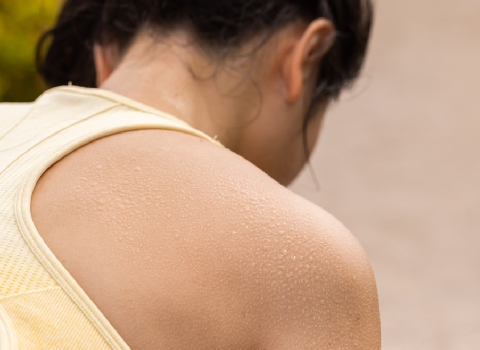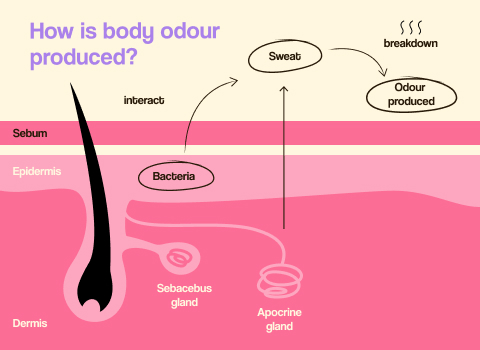Caring Microbiome Smart Deodorant
Natural Deodorant 40ml

Here are your essentials
for making it this far
Sweating is natural and essential for our body, so we shouldn't demonise it; but, how many times have we heard or said "Ugh, it smells like sweat in here" or "Wow... I smell bad" after a hot day, exercise or even if you are a little nervous... if all this sounds familiar, then allow us to debunk the myth: sweat doesn't smell! Yes, you heard that right, or read that right even, we have been "fooled" this whole time. But don't worry, and don't get ahead of yourself, we'll explain everything in detail below so that you can control that unpleasant smell that makes you feel uncomfortable. Knowing this will be a turning point for you and your personal hygiene, so hang tight.
Sweat, also known as perspiration, is one of our body's main thermoregulatory mechanisms, in other words, it's our cooling system. It helps us to regulate our body temperature. But how? When sweat evaporates from the skin's surface it results in heat loss, which consequently lowers the body temperature and protects the structures of the body that have an optimal temperature so that they can continue to function.
But in addition to this, sweat also removes waste substances and maintains a pH level that prevents the infiltration of harmful germs, bacteria, fungi and viruses into your body. Back off!!
Sweat is produced by either eccrine and/or apocrine sweat glands which can vary in density and size depending on ethnicity, gender and location on the body. These glands can be found aaaaaalll over the body and are functional from birth.
We're going to debunk another myth... the area of the body where we sweat the most is not the armpit. Underarm perspiration is one of the biggest worries for many people, but keep in mind that perspiration in this area is equivalent to only 1% of the total perspiration of our body... How do you feel about it now?
Looking at sweat glands once again, they generate a secretion (known as sweat) which is initially odourless (i.e., it has no smell), as it is made up of 99% water, while the remaining 1% is made up of amino acids, ions, lactic acid, glycerol, urea, peptides and proteins (cysteine in particular).

Sweating is a natural process regulated by the autonomous nervous system. That's why when you're very hot or are in a nervous or stressful situation (for example) your body produces sweat at a faster rate than it can evaporate, resulting in condensed beads of sweat forming on your skin.
If you feel that you sweat more intensely or excessively, you may be experiencing hyperhidrosis. It is related to overactive sweat glands and usually affects the hands, armpits, face and soles of the feet. If this is the case, then it is best to speak to a professional.
Let's resume... as we said, sweat is odourless, however, in the armpits and pubis a specific process occurs whereby a certain odour is released. Keep reading to find out more.
The apocrine glands, which are mainly located under the armpits and pubic area are more active when we exercise or experience high emotions. These glands secrete fatty acids and proteins, which, when mixed with the skin's bacteria (microbiome), will ferment, causing the "unpleasant smell".

But, how does this occur? Specifically, naturally occurring bacteria (Cutibacterium, Staphylococcus and Corynebacterium), which are present on our skin, feed on our sweat and release what we commonly call "body odour". In addition, the warm, moist conditions in the armpits make them an ideal place for bacteria to grow, coming into contact with substances produced by sweat (such as lactic acid and glycerol), transforming them into fatty acids, such as acetic acid and propionic acid, which are commonly found in vinegar and Swiss cheese. So, you can imagine where the smell comes from now, right?...
It is also important to bear in mind that your health, the intake of certain medications, lifestyle habits (tobacco, alcohol, body hygiene routine, washing of clothes, type of products used etc.) together with your diet, can have a direct influence on the composition of sweat, the bacterial flora of the skin and, consequently, on bad odours.
By balancing and respecting your microbiome. How? The first thing to understand, as we said at the beginning, is that sweat is essential for our body, so it is not a question of not sweating or blocking sweat, it is a question of preventing the growth of bacteria that produce unpleasant odours.
Most of the time, when we want to avoid that odour, we resort to deodorants or antiperspirants - but did you think they were the same? Well, no, let us clear things up for you
Didn't we already say that sweat is our thermostat? So, we shouldn't get rid of sweat, right? That's right, we need it to lower our temperature. What we can do is control this so-called "fermentation" that occurs when our sweat comes into contact with certain types of bacteria, resulting in the unpleasant smell. It is therefore recommended to look for deodorants that are formulated with active ingredients specially designed for this purpose, and which do not block perspiration, such as the following:
Now that you know why you sweat, how odour is produced and how you can control it, look for these active ingredients in the list of ingredients on your deodorant's label (INCI) and you're done.
Do you know where you can find these ingredients? In the Caring Microbiome Smart Deodorant, this natural deodorant successfully balances your microbiome so that you can sweat WITHOUT UNPLEASANT SMELLS! It contains the active ingredients mentioned above, which are especially suitable for inhibiting odour-causing bacteria. Try it out and feel the citrusy caress of this deodorant that is juuuuust as natural as sweating.
Beloved by your skin
Freshly wants to tell you something! At Freshly we keep on learning every day how to make decisions that bring us closer to a better future. Sometimes we are called dreamers, but what we really have is an optimistic vision and clear path for reaching that tomorrow.
Would you like to join this adventure? If you're here, it's because you are a demanding person when it comes to taking care of your body and the planet. By subscribing to the newsletteryou will receive articles like this one to continue learning, as well as news and exclusive discounts. Are you up for it?